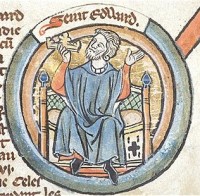On This Day: Death of Edward the Confessor
Posted on
On this day, 5th January 1066, King Edward of England died in London. He was sixty two years old and had no son, a fact that had cause considerable debate in England in the years leading up to his death, and would lead to an invasion by William Duke of Normandy later that year.
The lack of any child from Edward's marriage has puzzled historians for years. Edward only married when he was in his early forties, three years after he became King of England. The delay may have been because it was difficult for him to find a suitably high-status wife. He spent most of his life in exile in Europe, probably in his mother's homeland of Normandy. His inheritance of the English throne was taken by Danish conquerors, and any man that married a daughter to him could not be certain whether he was marrying a future King of England or a man who would never be able to return home. It may also be that Edward had no intention of marrying at all, after his death his widow would claim that he had sworn himself to a chaste life. If this is true then it could have been a decision he made early on in his adult life.
The theory that has been put forward in recent years is that Edward's lack of an heir was a deliberate snub to both his wife and his family. The woman he had married was Edith of Wessex, the daughter of Earl Godwin. Her family were extremely powerful and influential, and without their support Edward would have struggled to hold on to his throne. Edith appears to have been the price he paid for their on-going agreement to not rebel against him, but it doesn't mean he had to follow their plans exactly. It has been pointed out that Edward could have consistently refused to consummate his marriage with Edith, which would have Godwin over a barrel. He couldn't rebel against his son-in-law without removing his daughter from the throne too, and there was no real alternative without claiming the throne himself, which would not have gone down well with the rest of the Anglo-Saxon nobility.
At one point Godwin's family overstepped the mark and were exiled from England by Edward, while Edith was banished to a convent. But they soon reappeared a year later, and Edith was reunited with her husband. From that point it was impossible for Edward to divorce her, whether their childlessness was caused by a medical condition or a deliberate decision, it was not something that was going to change in the future. As a result Edward began to look around at his extended family for a potential man to name as his heir.
One of the earlier probabe candidates was Edward Aetheling, who was a nephew through the King's paternal half-brother Edmund Ironside. The Aetheling was recalled to England, but died shortly after arrival leaving his five year old son as another possible contender. Norman historians claimed that Edward offered the throne to William Duke of Normandy, who was distantly related to Edward but not through any Anglo-Saxon relations.
In the end Edward's death was witnessed by only had a handful of people, including his wife Edith and her brother Harold. They would go on to claim that Edward left his throne to Harold on his deathbed, and to emphasise the point Harold had himself crowned less than twenty four hours later at Westminster Abbey (the traditional coronation venue was Winchester Cathedral, which shows how quickly Harold had to move).
But as news of Edward's death spread across England and Europe in the following weeks, multiple claimants began to come out of the woodwork. By the end of 1066 England would have seen several bloody battles, the deaths of a large number of Anglo-Saxon nobles, and invasion forces from both Norway and Normandy.
Add a comment: